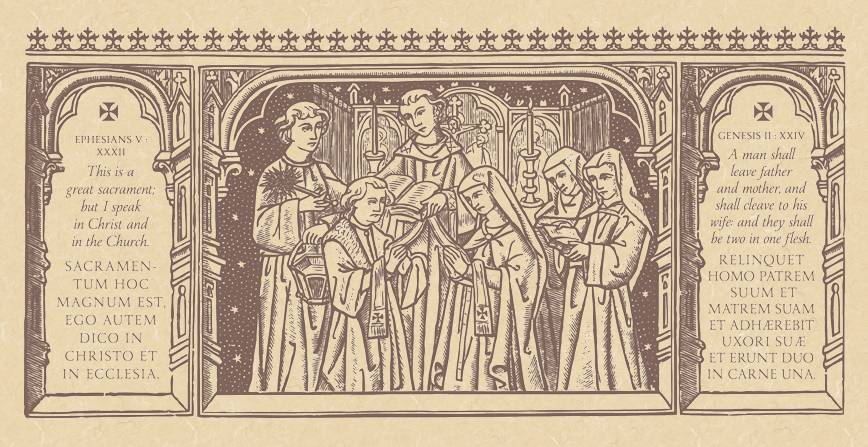We're All in This Together.
The Tenth Friday of Ordinary Time.
Lessons from the primary feria, according to the ordinary form of the Roman Rite:
• II Corinthians 4: 7-15.
• Psalm 116: 10-11, 15-18.
• Matthew 5: 27-32.
Ember Friday of Pentecost.*
Lessons from the Octave, according to the extraordinary form of the Roman Rite:
• Joel 2: 23-24, 26-27.
• [The Gradual is omitted.]
• [Sequence] Veni, Sancte Spiritus…**
• Luke 5: 17-26.
FatherVenditti.com
|
 6:36 AM 6/14/2019 — All this week, as we’ve been hearing from Matthew’s Gospel, our Lord has been refining some of the precepts of the Law of Moses, and using a form of hyperbole that was very common with the prophets of the Old Testament: “You have heard it said … but I say ….” By using that turn of phrase, He’s making a veiled claim to His own divinity, which certainly wasn’t lost on any pharisee who heard Him. It’s consistent with His purpose as stated in our Gospel lesson back on Wednesday, wherein He clearly states that He’s come not to abolish the law and the prophets, but to fulfill them. The hyperbole of the remarks is very much an Old Testament literary device; so, when our Lord tells us to pluck out our eye should it cause us to sin, I’m hoping no one here will actually do that. 6:36 AM 6/14/2019 — All this week, as we’ve been hearing from Matthew’s Gospel, our Lord has been refining some of the precepts of the Law of Moses, and using a form of hyperbole that was very common with the prophets of the Old Testament: “You have heard it said … but I say ….” By using that turn of phrase, He’s making a veiled claim to His own divinity, which certainly wasn’t lost on any pharisee who heard Him. It’s consistent with His purpose as stated in our Gospel lesson back on Wednesday, wherein He clearly states that He’s come not to abolish the law and the prophets, but to fulfill them. The hyperbole of the remarks is very much an Old Testament literary device; so, when our Lord tells us to pluck out our eye should it cause us to sin, I’m hoping no one here will actually do that.
That being said, today our Lord continues his lesson about how He fulfills the Law of Moses by instructing us about divorce, to wit, there’s no such thing, His qualifier about a marriage that is “unlawful” referring to incestuous unions that were not uncommon among the Hellenistic cultures that made up much of the known world at the time; but, the really beneficial aspect of His remark is hidden in the last verse of today’s lesson, wherein He uses a peculiar turn of phrase, telling us that when someone divorces his wife, he causes her to commit adultery, and leads anyone with whom he takes up to do the same.
Set aside, for the moment, any discussion about divorce; the really important point here is the “domino effect” that takes place when we allow ourselves to enter into an occasion of sin with another person. When you go into confession and tell the priest, “I was impure with my boyfriend/girlfriend/fiance,” it’s not your personal impurity that is the most serious problem; it’s what you have led another to do. That’s what our Lord was referring to when He told us that those who lead others astray should have a millstone tide around their neck and thrown into the sea. Surely, it’s not good to commit a sin, but to tempt another to commit a sin is a thousand times worse.
But even beyond the pragmatic, we must also be conscious of the mystical dimension of the Communion of the Saints: there’s no such thing as a personal sin that doesn’t hurt another. All sin is communal, inasmuch as the Body of Christ is weakened by any sin committed by any Christian; but, it also means that even the most secret and personal sins we may commit, be they venial or mortal, wound the Body of Christ. The takeaway for us today is: our personal struggle against sin is not just something we should do for ourselves, but is a duty we owe to all our brothers and sisters in the faith.

* In the extraordinary form of the Roman Rite, at the beginning of the four seasons of the year, the fast days known as "Ember Days" thank God for blessings obtained during the past year and implore further graces for the new season; and, their importance in the Church was formerly very great. They are fixed on the Wednesday, Friday and Saturday of specific weeks in their respective seasons: after the First Sunday of Lent for Spring, after Whitsunday (Pentecost) for Summer, after the Feast of the Elevation of the Cross (Sept. 14th) for Autumn, and after the Third Sunday of Advent for Winter. At one time, the Ember Days were obligatory days of fasting; this requirement was dropped in the Missal of St. John XXIII in 1962, but violet vestments are sill worn on Ember Days even when they occur outside the seasons of Advent and Lent, with the exception of the Ember Days that occur during the Octave of Pentecost.
The significance of the Ember Days as days of voluntary fasting is multiple: not only are they intended to consecrate to God both the liturgical seasons and the various seasons in nature, they also serve as a penitential preparation for those preparing for the Holy Priesthood. Ordinations in the extraordinary form generally take place on the Ember Days, and the Faithful are encouraged to pray on these days for good priests.
** Cf. the post for Pentecost Sunday for a translation of the Sequence.
|

